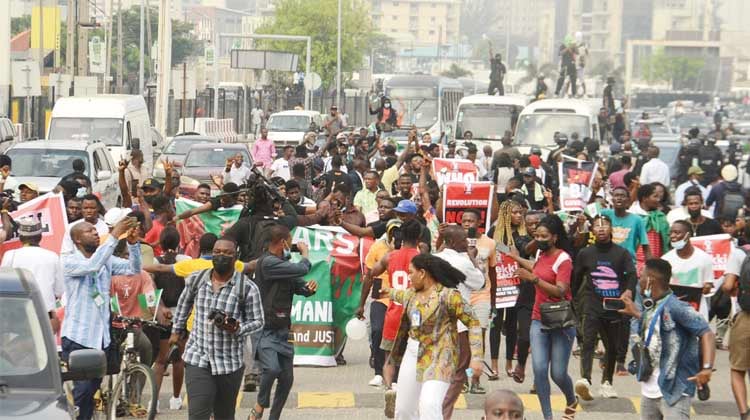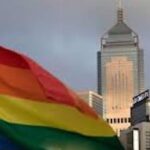Renewed Push for Nnamdi Kanu’s Release Rekindles Nigeria’s Legacy of Protest Movements

The renewed agitation for the release of detained IPOB leader, Nnamdi Kanu, has once again spotlighted Nigeria’s long tradition of protest politics, a history marked by ordinary citizens challenging authority in pursuit of justice, reform, and accountability.
From the colonial-era Aba Women’s Riot to the youth-led End SARS demonstrations, public protest has long served as a moral compass for the nation, a means through which the governed confront power and demand change.
As rallies and advocacy intensify over Kanu’s continued detention, analysts say the movement fits into a historical pattern of civic resistance that has shaped Nigeria’s political and social evolution.
Here are five landmark protests that defined that tradition:
1. Aba Women’s Riot (1929)
Location: Eastern Nigeria — Owerri and Calabar Provinces
Thousands of Igbo women revolted against colonial tax plans that threatened their economic independence and traditional authority.
According to BlackPast, the women feared the new taxes would destroy their trading livelihoods and food security. By November 1929, massive crowds gathered at Native Administration centres to denounce warrant chiefs and the proposed levy.
Using traditional methods of resistance known as “sitting on a man” singing, dancing, and mocking corrupt officials, the women compelled some local chiefs to resign. The protests soon escalated into attacks on European shops, banks, and courts, prompting colonial police to open fire in Calabar and Owerri. Over 50 women were killed and many others injured.
In all, an estimated 25,000 women took part. The British administration was forced to scrap the tax plan and review the Warrant Chief system, exposing the weaknesses of indirect rule and establishing one of Africa’s earliest female-led resistance movements.
2. “Ali Must Go” Protests (1978)
Location: Universities nationwide
A government decision to raise university meal ticket prices by 50 kobo triggered widespread student unrest under the military regime of General Olusegun Obasanjo.
The National Union of Nigerian Students (NUNS), led by Segun Okeowo, organised nationwide demonstrations to resist the increase. What began as peaceful campus protests quickly spread to universities in Ibadan, Ife, Lagos, and Zaria, with students boycotting lectures and taking to the streets under the slogan “Ali Must Go” a demand for the resignation of Education Commissioner Colonel Ahmadu Ali.
Security crackdowns turned violent, leaving several students dead. Though NUNS was later banned, the government eventually reviewed its policy. The episode entrenched radical student activism as a major force in Nigeria’s civic life.
3. June 12 Protests (1993)
Location: Lagos and South-West Nigeria
Public outrage erupted after military ruler General Ibrahim Babangida annulled the June 12, 1993 presidential election, widely regarded as Nigeria’s freest and fairest, which was won by Chief Moshood Kashimawo Olawale (M.K.O.) Abiola.
Civil society groups, labour unions, and pro-democracy coalitions such as the Campaign for Democracy and NADECO led mass demonstrations demanding restoration of the election results. Protests, particularly intense in the South-West, met violent responses from security forces.
The persistent agitation delegitimised military rule, forcing Babangida to “step aside” in August 1993. The movement’s ideals endured until Nigeria’s democratic transition in 1999. Today, June 12 is commemorated as Democracy Day, a lasting symbol of the people’s defiance against electoral injustice.
4. Occupy Nigeria (2012)
Location: Nationwide — major rallies in Lagos and Abuja
Mass protests erupted on January 1, 2012, after President Goodluck Jonathan’s administration removed the fuel subsidy, doubling petrol prices overnight from ₦65 to ₦141 per litre.
The price shock triggered soaring transport fares and living costs, drawing tens of thousands into the streets. Labour unions and civil society groups coordinated nationwide strikes, while social media platforms amplified mobilisation.
After nearly two weeks of paralysis, the government bowed to pressure, partially restoring the subsidy and lowering petrol prices to ₦97 per litre. The movement marked the dawn of Nigeria’s modern digital-era protest culture.
5. End SARS (2020)
Location: Nationwide and in the diaspora
The #EndSARS protests of October 2020 erupted after years of anger over police brutality, extortion, and extrajudicial killings by the Special Anti-Robbery Squad (SARS).
A viral video allegedly showing SARS officers shooting a man in Delta State ignited nationwide outrage. Young Nigerians mobilised via social media, staging peaceful demonstrations in Lagos, Abuja, Port Harcourt, Ibadan, and beyond.
With no formal leadership, the protests relied on crowdfunding and volunteer coordination led by civic groups like the Feminist Coalition. Despite their peaceful nature, clashes later broke out, culminating in the October 20 shooting of protesters at the Lekki Toll Gate in Lagos.
The government disbanded SARS and promised police reforms. The movement, however, redefined public protest in Nigeria, and asserting a new generation’s voice in national discourse.
From Aba to Lekki, these moments illustrate a recurring truth in Nigeria’s history: when official institutions falter, the street becomes the courtroom of the people.
As calls for Kanu’s release grow louder, Nigerians once again revisit a familiar script, one where protest serves not just as resistance, but as a reminder that democracy itself thrives on dissent.









